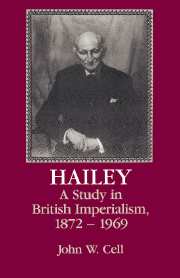Book contents
- Frontmatter
- Contents
- List of abbreviations
- Glossary of foreign words
- Preface
- 1 Early life
- 2 Colonization officer, 1901–1906
- 3 From Sargodha to Delhi, 1907–1912
- 4 Chief commissioner of Delhi, 1912–1918
- 5 A report on the Punjab
- 6 Finance member, 1919–1922
- 7 Home member, 1922–1924
- 8 Governor of the Punjab: the Sikhs, 1924–1925
- 9 Governor of the Punjab: the communal problem, 1924–1926
- 10 Governor of the Punjab: the communal problem, 1927–1928
- 11 Governor of the United Provinces, 1928–1930
- 12 Governor of the United Provinces: civil disobedience and Round Table Conference, 1930–1931
- 13 Governor of the United Provinces: 1931, year of crisis
- 14 Governor of the United Provinces: winding down, 1932–1934
- 15 Surveyor of Africa, 1935–1939
- 16 Two missions to Africa, 1939–1940
- 17 A report and a vision, 1941–1942
- 18 Adviser and propagandist, 1942–1945
- 19 Indian partition and the onset of African decolonization, 1945–1949
- 20 Defender of the faith, 1949–1969
- Bibliography
- Index
Preface
Published online by Cambridge University Press: 12 October 2009
- Frontmatter
- Contents
- List of abbreviations
- Glossary of foreign words
- Preface
- 1 Early life
- 2 Colonization officer, 1901–1906
- 3 From Sargodha to Delhi, 1907–1912
- 4 Chief commissioner of Delhi, 1912–1918
- 5 A report on the Punjab
- 6 Finance member, 1919–1922
- 7 Home member, 1922–1924
- 8 Governor of the Punjab: the Sikhs, 1924–1925
- 9 Governor of the Punjab: the communal problem, 1924–1926
- 10 Governor of the Punjab: the communal problem, 1927–1928
- 11 Governor of the United Provinces, 1928–1930
- 12 Governor of the United Provinces: civil disobedience and Round Table Conference, 1930–1931
- 13 Governor of the United Provinces: 1931, year of crisis
- 14 Governor of the United Provinces: winding down, 1932–1934
- 15 Surveyor of Africa, 1935–1939
- 16 Two missions to Africa, 1939–1940
- 17 A report and a vision, 1941–1942
- 18 Adviser and propagandist, 1942–1945
- 19 Indian partition and the onset of African decolonization, 1945–1949
- 20 Defender of the faith, 1949–1969
- Bibliography
- Index
Summary
I first encountered Lord Hailey in his role as director of the African Survey (1938), the pivotal project that culminated the discussion of African affairs by Britain's interwar generation, helped set the agenda for the colonial reform movement of the war years, and indirectly pointed toward decolonization in the postwar era. Paradoxically, despite the fact that Hailey served forty years in India and was commonly regarded as the most distinguished member of the Indian Civil Service in the twentieth century, his African phase is better known. When I began research for this book I was already conscious that the imbalance needed to be corrected. More important, I wished to move into what for me was then the virtually unknown field of India. Hailey was my bridge across the Indian Ocean.
His sheer longevity and ubiquity bear stressing. Born in 1872, the year Disraeli at the Crystal Palace gave the speech sometimes regarded as the end of Little Englandism and the beginning of the New Imperialism, Hailey was educated at Merchant Taylors’ School and Oxford, joining the Punjab branch of the Indian Civil Service in 1895. After five years in the secretariat, between 1901 and 1906 he was the founding colonization officer for the Lower Jhelum canal colony in the western Punjab, the formative experience of his adult life. In 1907–11 he was secretary in the finance department of the central Government of India.
- Type
- Chapter
- Information
- HaileyA Study in British Imperialism, 1872–1969, pp. xi - xviPublisher: Cambridge University PressPrint publication year: 1992



